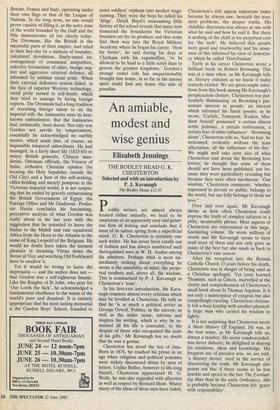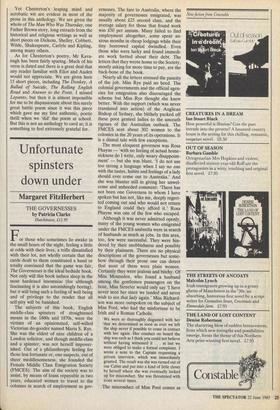An amiable,
modest and wise genius
Elizabeth Jennings
THE BODLEY HEAD G. K. CHESTERTON Selected and with an introduction by P. J. Kavanagh
The Bodley Head, £12.95
Prolific writers are almost always treated rather unjustly; we tend to be suspicious of an apparently easy and gener- ous flow of writing and conclude that it must of its nature spring from a superficial mind. G. K. Chesterton is certainly one such writer. He has never been totally out of fashion and has always numbered such distinguished men as W. H. Auden among his admirers. Perhaps what is most im- mediately striking about everything he wrote is the amiability of mind, the perpe- tual modesty and, above all, the wisdom. This is summarised by P. J. Kavanagh as Chesterton's 'tone'.
In his first-rate introduction, Mr Kava- nagh counters almost every criticism which may be levelled at Chesterton. He tells us that he 'is as much a political writer as George Orwell. Politics, in the narrow, as well as the wider sense, informs and inspires his writing, which is why he re- mained all his life a journalist, to the despair of those who recognised the scale of his gifts.' Mr Kavanagh has no doubt that he was a genius.
Chesterton has stood the test of time. Born in 1874, he reached his prime in an age when religious and political polemics were widely discoursed about by men of letters. Unlike Belloc, however (a life-long friend), Chesterton appreciated H. G. Wells; he was also regarded with affection as well as respect by Bernard Shaw. Where many of the ideas of these men have faded, Chesterton's still appear important today because he always saw, beneath the tran- sient problems, the deeper truths. His childlike directness was always at one with what he said and how he said it. But there is nothing of the child in his perpetual care for 'the mob'. He believed that people were good and trustworthy and his assur- ance of this informed his view of democra- cy which he called 'Distributism'.
Early in his career Chesterton wrote a brilliant book on Robert Browning. This was at a time when, as Mr Kavanagh tells us, literary criticism as we know it today scarcely existed. We are given ample selec- tions from this book among Mr Kavanagh's perspicacious choices. Chesterton was par- ticularly illuminating on Browning's pas- sionate interest in people, an interest which informed his finest poems; as he wrote, 'Carlyle, Tennyson, Ruskin, Mat- thew Arnold' possessed 'a certain almost noble jealousy, a certain restlessness, a certain fear of other influences'. 'Browning alone', Chesterton tells us, 'had no fear, he welcomed, evidently without the least affectation, all the influences of his day.' We might well take note also of what Chesterton said about the Browning love letters; he thought that some of them should not have been published, not be- cause they were particularly revealing but because they were often incoherent. 'Our wisdom,' Chesterton comments, 'whether expressed in private or public, belongs to the world, but our folly belongs to those we love.'
Over and over again, Mr Kavanagh shows us how often Chesterton could express the truth of complex subjects in a pithy, memorable phrase. Most aspects of Chesterton are represented in this large, fascinating volume. He wrote millions of words and Mr Kavanagh seems to have read most of them. and not only gives us many of the best but also sends us back to Chesterton's vast oeuvre.
After his reception into the Roman Catholic Church 13 years before his death, Chesterton was in danger of being used as a Christian apologist. Yet even learned Thomists, such as Gilson, marvelled at the clarity and comprehension of Chesterton's small book about St Thomas Aquinas. It is not only a masterpiece of exegesis but also compellingly exciting. Chesterton obvious- ly felt a deep kinship with another physical- ly large man who carried his wisdom so lightly.
It is not surprising that Chesterton wrote A Short History Of England. He was, in the best sense, as Mr Kavanagh tells us, always a teacher. He never condescended, was never didactic; he delighted in sharing his intuitions, ideas and knowledge. His frequent use of paradox was, we are told, `a literary device' used in the service of discovering the. truth. Mr Kavanagh also points out that if there seems to be less sparkle and speed in the late The Everlast- ing Man than in the early Orthodoxy, this is probably because Chesterton felt 'grave with responsibility'. Yet Chesterton's leaping mind and acrobatic wit are evident in most of the prose in this anthology. We are given the whole of The Man Who Was Thursday, one Father Brown story, long extracts from the historical and religious writings as well as short pieces on Dickens, Shelley, Cobbett, Wilde, Shakespeare, Carlyle and Kipling, among many others.
As for Chesterton's poetry, Mr Kava- nagh has been fairly sparing. Much of his verse is dated and there is a great deal that any reader familiar with Eliot and Auden would not appreciate. We are given here 15 short pieces, including The Donkey, A Ballad of Suicide, The Rolling English Road and Answer to the Poets. I missed Lepanto, but then it is almost impossible for me to be dispassionate about this surely great battle poem since it was this piece which gave me my first authentic, poetic thrill when we 'did' the poem at school. But this is not an anthology to cavil at; it is something to feel extremely grateful for.















































 Previous page
Previous page